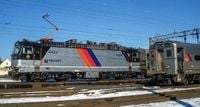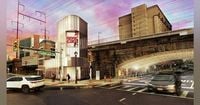For commuters across New Jersey, this summer has been a season of frustration and anticipation. NJ Transit, the state’s primary rail operator, faced its third-highest level of train cancellations under Governor Phil Murphy between June 1 and August 31, 2025. With 1,646 trains canceled over those three months, riders found themselves grappling with delays, uncertainty, and questions about the future of their daily commutes. Yet, amid these operational headaches, a major infrastructure project—the modernization of New Brunswick Train Station—promises a brighter future for the state’s transit system.
According to New Jersey Monitor, the spike in cancellations was driven by a perfect storm of mechanical issues, equipment shortages, and a resurgence of crew-related problems. Mechanical failures alone accounted for 634 cancellations, the highest number since Murphy took office in 2018. This troubling trend has continued for three consecutive years, underscoring the aging nature of the agency’s fleet and the mounting difficulties in maintaining decades-old equipment.
Equipment availability also emerged as a significant culprit. In summer 2025, 288 trains were canceled due to a lack of available equipment—nearly six times the cancellations for this reason seen in the same period the previous year. This figure marks a record high during Murphy’s tenure and highlights a systemic problem that has plagued the agency for years. Back in 2018, 265 trains were canceled for the same reason, but the current numbers paint a far more dire picture.
"What is happening right now is an inevitable result of years of underfunding of New Jersey Transit," said Alex Ambrose, a policy analyst at New Jersey Policy Perspective, a think-tank advocating for increased state support of public transit. Ambrose’s words echo the frustrations of countless commuters who have come to depend on the reliability of NJ Transit for work, school, and daily life.
In response to these mounting challenges, NJ Transit is in the midst of a sweeping fleet replacement initiative. The agency has ordered 374 new train cars—including 58 self-propelled power cars—with the first of these slated to enter service by mid-2026. Jim Smith, a spokesperson for NJ Transit, explained, "The new cars, which include 58 self-propelled power cars, will significantly enhance service reliability … replacing the oldest and least reliable rail cars in the fleet, the 50+ year-old Arrow III cars, which are increasingly more difficult to maintain due to their advanced age and the subsequent difficulty in sourcing parts."
Smith added that these new cars are expected to have a mean distance between failures—a key metric of reliability—of roughly 400,000 miles. That’s a dramatic improvement compared to the July 2025 figure of just 47,747 miles, the lowest level seen under Murphy. If all goes according to plan, NJ Transit will boast a fully modernized fleet by 2031. While these upgrades offer hope for the future, Ambrose was quick to point out, "What they care about is that their form of transit is there on time and gets them where they need to go, and riders have not had that experience." For many, the promise of new trains next year offers little comfort amid the current wave of disruptions.
But not all the news has been bleak. Amtrak-related cancellations, which wreaked havoc on NJ Transit’s schedule last summer, plummeted from 527 in 2024 to just 38 this year. This improvement is largely thanks to extensive infrastructure upgrades by Amtrak, which leases its tracks and infrastructure to NJ Transit along the Northeast Corridor—the busiest commuter rail line in the United States. Smith credited Amtrak for repairing or replacing approximately 10,000 components along 240 miles of overhead wires. These catenary systems, often vulnerable to heat-induced sagging and electrical failures, were a major source of weather-related disruptions in previous years. Ambrose acknowledged, "It’s clear Amtrak has prioritized the rider experience based on this and has made significant improvements where NJ Transit is still struggling."
Despite these improvements, delays remain a stubborn issue. Between June and August, 88.2% of NJ Transit trains arrived within six minutes of their scheduled time. If Amtrak delays are excluded, the on-time rate jumps to 91.2%. Still, for the thousands of daily riders, even small delays can add up to big headaches.
Another major challenge this summer was a resurgence of crew-related cancellations, which had dropped to almost zero in 2023 and 2024. In 2025, however, 259 trains were canceled due to crew shortages, a dramatic increase from just 10 the year before. This uptick followed the resolution of a protracted contract dispute between NJ Transit and the Brotherhood of Locomotive Engineers and Trainmen, which ended with a three-day strike in mid-May. Two-thirds of these crew-related cancellations occurred in August, fueled by a surge in unplanned engineer absences.
Smith reported, "There were 284 unplanned engineer absences in July 2024. In July 2025, there were 484 unplanned engineer absences—that is a 70% increase." In fact, the number of unplanned absences in just the first 18 days of August 2025 exceeded the total for the entire month of August 2024. In response, NJ Transit sent a letter to the union on August 22, directing officials to halt the unplanned absences. Tom Haas, general chairman of the union, explained that increased work hours and vacation schedules had sometimes triggered federal regulations limiting consecutive workdays, which could result in unplanned absences. He also noted that engineers can only operate on lines they are specifically qualified for, further limiting the pool of available workers in a pinch.
While NJ Transit grapples with these operational woes, progress is underway on the infrastructure front. Middlesex County and NJ Transit are moving into the construction phase for the modernization and expansion of the New Brunswick Train Station, one of the busiest transit hubs along the Northeast Corridor. According to county officials, construction will begin in late fall 2025 and is expected to wrap up by 2028. The multi-phase project will start with sidewalk and exterior work along Easton Avenue and Albany Street, followed by the construction of a new ticketing center with an elevator and waiting areas, and major renovations to the historic station building and platforms.
Vertical circulation improvements, such as elevators and escalators, have already been completed as part of an earlier phase. The station’s transformation is backed by a $49 million allocation in New Jersey’s 2023 fiscal budget, with AECOM awarded a $7 million design services contract last November. NJ Transit and Rutgers University have also inked a three-year agreement to make New Brunswick Station the official Home of Rutgers University, weaving the state’s top public research university even more tightly into the region’s transportation fabric.
Middlesex County Commissioner Director Ronald G. Rios summed up the project’s ambitions: "The improvements we’re making to the New Brunswick Station will prepare us for the future. We are building a strong, sustainable and resilient economy with the next generation in mind while cultivating a mass transit culture in this region." Governor Murphy echoed these sentiments, emphasizing that the upgrades are part of a broader commitment to modernizing New Jersey’s transportation infrastructure for both commuters and residents.
Despite the summer’s disruptions, the state’s investment in new trains and modernized stations signals a commitment to turning the page on years of underfunding and operational challenges. For NJ Transit riders, the hope is that these changes will soon translate into a more reliable, comfortable, and efficient commute—one that finally delivers on decades of promise.


